Collection of materials relating to neuro-ophthalmology as part of the Neuro-Ophthalmology Virtual Education Library.
NOVEL: https://novel.utah.edu/
TO
- NOVEL720
| Title | Creator | Description | Subject | ||
|---|---|---|---|---|---|
| 326 |
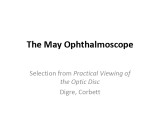 |
The May Ophthalmoscope | Kathleen B. Digre, MD; James J. Corbett, MD | History of the ophthalmoscope developed by Charles May | Ophthalmosocope; History |
| 327 |
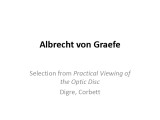 |
Albrecht von Graefe | Kathleen B. Digre, MD; James J. Corbett, MD | Biography of Albrecht von Graefe. | Albrecht von Graefe; History |
| 328 |
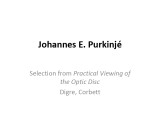 |
Johannes E. Purkinjé | Kathleen B. Digre, MD; James J. Corbett, MD | Biography of Johannes E. Purkinjé. | Johannes E. Purkinjé; History |
| 329 |
 |
Hughlings Jackson | Kathleen B. Digre, MD; James J. Corbett, MD | Biography of Hughlings Jackson. | Hughlings Jackson; History |
| 330 |
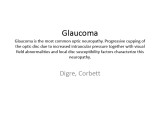 |
Glaucoma | Kathleen B. Digre, MD; James J. Corbett, MD | Slideshow describing condition. | Glaucoma |
| 331 |
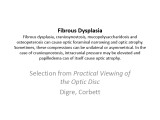 |
Fibrous Dysplasia | Kathleen B. Digre, MD; James J. Corbett, MD | Slideshow describing condition. | Dysplasia; Fibrous Dysplasia |
| 332 |
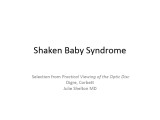 |
Shaken Baby Syndrome | Kathleen B. Digre, MD; James J. Corbett, MD | Neuro-ophthalmologic implications of shaken baby syndrome. | Shaken Baby Syndrome; Child Abuse; Abuse |
| 333 |
 |
Direct Carotid Cavernous Fistula | Emory Eye Center | Slideshow describing condition. | Fistula |
| 334 |
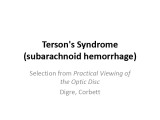 |
Terson's Syndrome | Kathleen B. Digre, MD; James J. Corbett, MD | Slideshow describing condition. | Terson's Syndrome; Hemhorrhage |
| 335 |
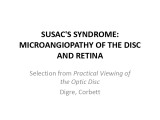 |
Susac's Syndrome | Kathleen B. Digre, MD; James J. Corbett, MD | Slideshow describing condition. | Susac's Syndrome |
| 336 |
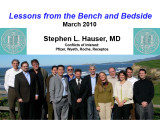 |
Lessons From Bench Bedside | Shirley H. Wray, MD, PhD, FRCP | See also: http://content.lib.utah.edu/cdm/ref/collection/ehsl-shw/id/69, http://content.lib.utah.edu/cdm/ref/collection/ehsl-shw/id/282, http://content.lib.utah.edu/cdm/ref/collection/ehsl-shw/id/94, and http://content.lib.utah.edu/cdm/ref/collection/ehsl-shw/id/103 | Bilateral Internuclear Ophthalmoplegia; Pendular Horizontal Oscillations; Lid Nystagmus; Upbeat Nystagmus; Botulinum Toxin Therapy; Multiple Sclerosis; Horizontal Pendular Nystagmus; Gaze Evoked Upbeat Nystagmus; Abducting Nystagmus; Normal Convergence; Gaze Evoked Downbeat Nystagmus; Sac... |
| 337 |
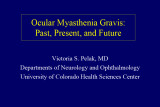 |
Ocular Myasthenia Gravis: Past, Present, Future | Victoria S. Pelak, MD | Slideshow describing condition. | Bilateral Myasthenia Gravis; Bilateral Ptosis; Bilateral Weakness of Adduction; Decompensated Phoria; External Ophthalmoplegia; Familial Myasthenia Gravis; Myasthenic Lid Twitch; Ocular Myasthenia Gravis; Positive Tensilon Test; Pseudo-internuclear Ophthalmoplegia; Tensilon Test; Unilateral Myasthen... |
| 338 |
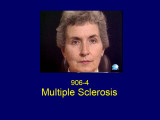 |
Multiple Sclerosis | Shirley H. Wray, MD, PhD, FRCP | Slideshow describing condition. | Bilateral Lid Nystagmus; Horizontal Saccadic Dysmetria; Jerk Oscillations; Lid Nystagmus; Multiple Sclerosis; Primary Position Upbeat Nystagmus; Rotary Nystagmus; Saccadic Dysmetria; Saccadic Pursuit; Square Wave Jerks; Torsional Nystagmus; Upbeat Nystagmus |
| 339 |
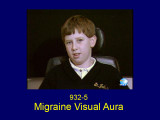 |
Migraine Visual Aura | Shirley H. Wray, MD, PhD, FRCP | Slideshow describing condition. | Alice in Wonderland Syndrome; Macropsia - Hemi-macropsia; Metamorphopsia; Migraine Visual Aura Without Headache; Occipital Lobe; Visual Phenomena |
| 340 |
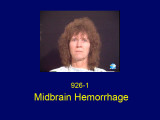 |
Midbrain Hemorrhage | Shirley H. Wray, MD, PhD, FRCP | Slideshow describing condition. | Cavernous Angioma; Convergence Retraction Nystagmus; Light/Near Dissociation of the Pupils; Midbrain Hemorrhage; Normal Convergence; Pretectal Syndrome; Skew Deviation; Supranuclear Paralysis of Upgaze Hemorrhage; Vertical Oculocephalic Reflex Normal |
| 341 |
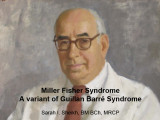 |
Miller Fisher Syndrome: A Variant of Guillan Barré Syndrome | Sarah I. Sheikh, BM, BCh, MRCP | Presentation covering the Miller Fisher Syndrome, a variant of Guillan Barre Syndrome. | Acute Inflammatory Demyelinating Neuropathy; Areflexia; Bilateral Ptosis; Bilateral Sixth Nerve Palsy; Esotropia; Facial Diplegia; Facial Weakness; Guillian Barre Syndrome - Miller Fisher Syndrome; Normal Pupils; Paresis of Conjugate Upgaze; Total External Ophthalmoplegia; Voluntary Ptosis |
| 342 |
 |
Dry Eye Syndrome (Spanish) | NANOS | People with abnormalities of the tear film are diagnosed with "dry eyes", but some patients with "dry eyes" may not feel that their eyes are "dry". Itching, burning, a scratchy sensation, a sensation that there is sand or grit in the eye, or intermittent blurring of the vision can all be symptoms of... | Dry Eye Syndrome; Patient Brochure |
| 343 |
 |
Dry Eye Syndrome | NANOS | People with abnormalities of the tear film are diagnosed with "dry eyes", but some patients with "dry eyes" may not feel that their eyes are "dry". Itching, burning, a scratchy sensation, a sensation that there is sand or grit in the eye, or intermittent blurring of the vision can all be symptoms of... | Dry Eye Syndrome; Patient Brochure |
| 344 |
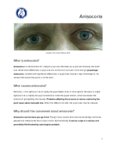 |
Anisocoria | NANOS | Anisocoria is a medical term for unequal pupil size. Normally our pupils are relatively the same size. While small differences in pupil size are normal and can even come and go ( physiologic anisocoria ), constant and significant differences in pupil sizes may be a sign of damage to the nerves that ... | Anisocoria; Patient Brochure |
| 345 |
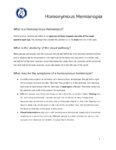 |
Homonymous Hemianopia | NANOS | This refers to an absence of vision towards one side of the visual world in each eye. The damage that caused this problem is in the brain and not in the eyes. Updated April 2020. | Homonymous Hemianopia; Patient Brochure |
| 346 |
 |
Optic Disc Drusen | NANOS | Optic disc drusen are abnormal deposits of protein-like material in the optic disc - the front part of the optic nerve. Updated April 2020. | Optic Disc Drusen; Patient Brochure |
| 347 |
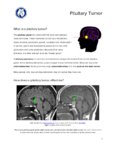 |
Pituitary Tumor | NANOS | Pituitary tumors are benign (non-cancerous) overgrowth of cells that make up the pituitary gland (the master gland that regulates other glands in the body). Updated April 2020. | Pituitary Tumor; Patient Brochure |
| 348 |
 |
Hemifacial Spasm - Large Print | NANOS | Involuntary contractions, called "spasms," of the muscles on one side of the face. The affected side of the face seems to "scrunch up" while the other side of the face remains normal. | Hemifacial Spasm; Patient Brochure |
| 349 |
 |
Hemifacial Spasm | NANOS | Involuntary contractions, called "spasms," of the muscles on one side of the face. The affected side of the face seems to "scrunch up" while the other side of the face remains normal. | Hemifacial Spasm; Patient Brochure |
| 350 |
 |
Hemifacial Spasm (French) | NANOS | Involuntary contractions, called "spasms," of the muscles on one side of the face. The affected side of the face seems to "scrunch up" while the other side of the face remains normal. | Hemifacial Spasm; Patient Brochure |
